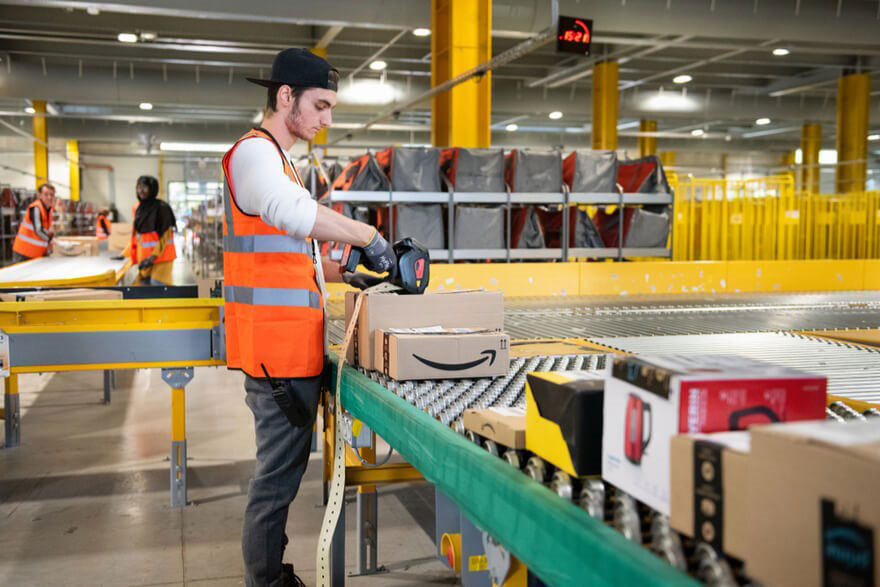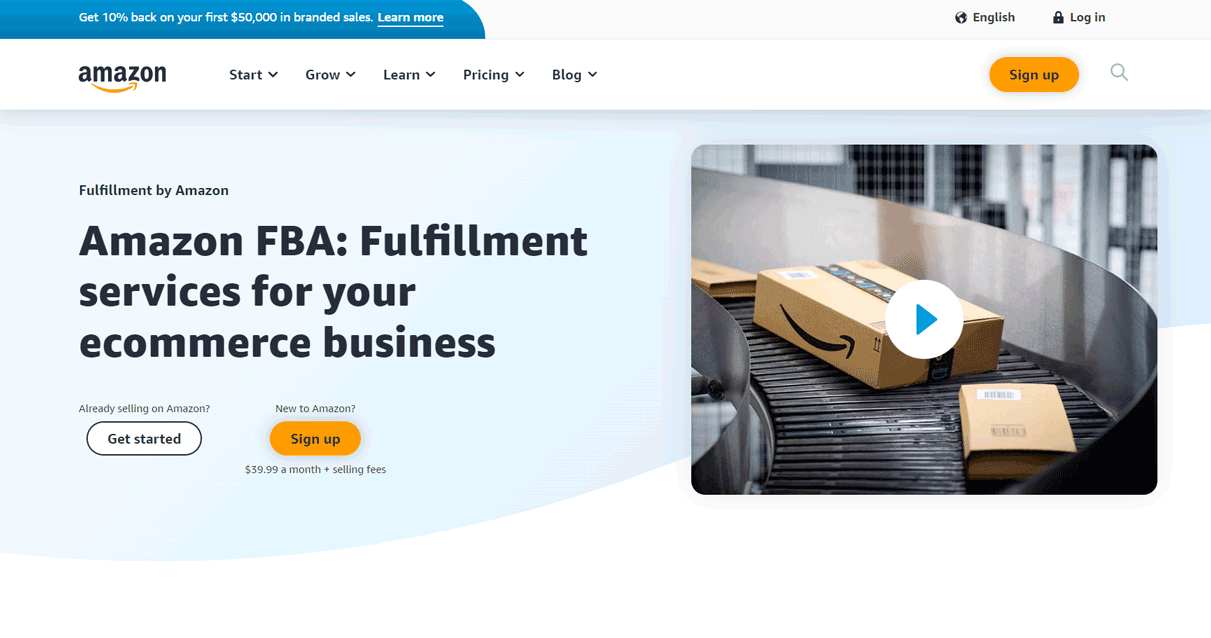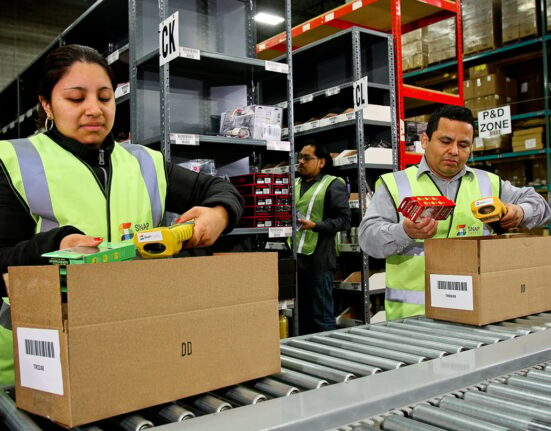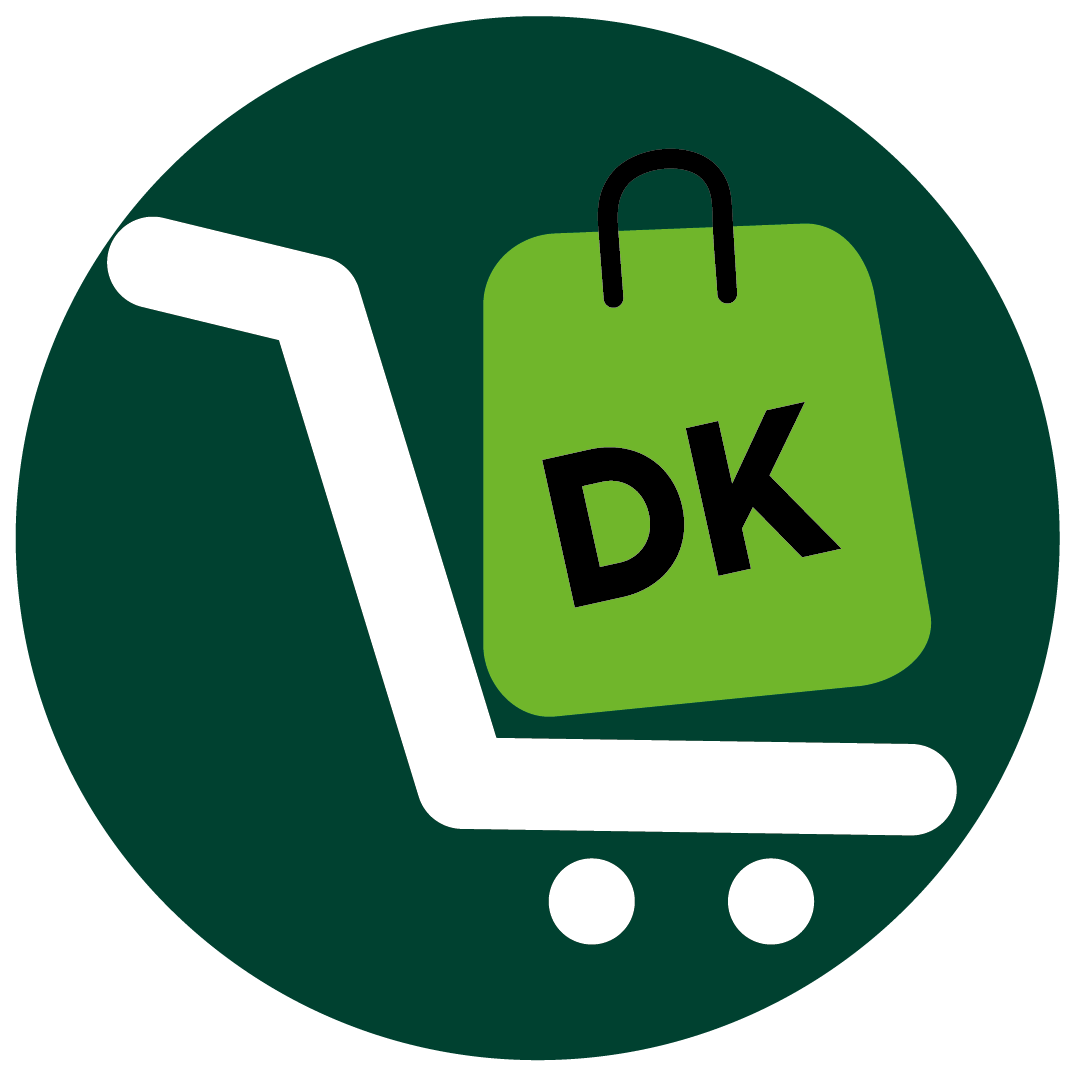Our Verdict
Amazon FBA, also known as Fulfilment by Amazon, is a great way to sell online, especially for beginners. This service allows businesses to sell their products on Amazon without having to worry about shipping, fulfilment, or customer service. Businesses ship their goods to Amazon fulfilment centres, and the company handles the rest. Larger customer base access, more sales, and a decentralized fulfilment strategy are just a few advantages that make it an excellent choice for businesses of all sizes.
>>> MORE : Amazon FBA: Worth it or Not?
- Pros
- Increase sales: When you use Amazon FBA, your products will be featured on Amazon’s website and will be eligible for Amazon Prime. This can result in a significant increase in sales.
- Access to a wider customer base: With Amazon FBA, you’ll have access to millions of potential customers who are already using Amazon.
- Hands-off fulfilment: With Amazon FBA, you won’t have to worry about packing, shipping, or customer service. Amazon will handle all of that for you.
- Scalability: With Amazon FBA, you can easily scale your business up or down as needed without worrying about storage or fulfilment.
- Cons
- Loss of customer control: Amazon handles fulfilment, you won’t have control over the customer experience.
- Storage limitations: The amount of inventory you can have on hand may be impacted by Amazon’s storage space limitations.
- High FBA fees: It’s important to remember that there are other costs related to the service, such as selling, fulfilment, and storage fees. When choosing whether or not to use Amazon FBA, it’s crucial to carefully examine your budget because these fees might mount up.
- Hidden cost: Costs may apply for packaging supplies, handling returns, and product preparation to satisfy Amazon’s requirements.
- Increased returns: Your earnings may be negatively affected by greater return rates as a result of Amazon’s customer-centric return policy.
Who Amazon FBA Is Best For?
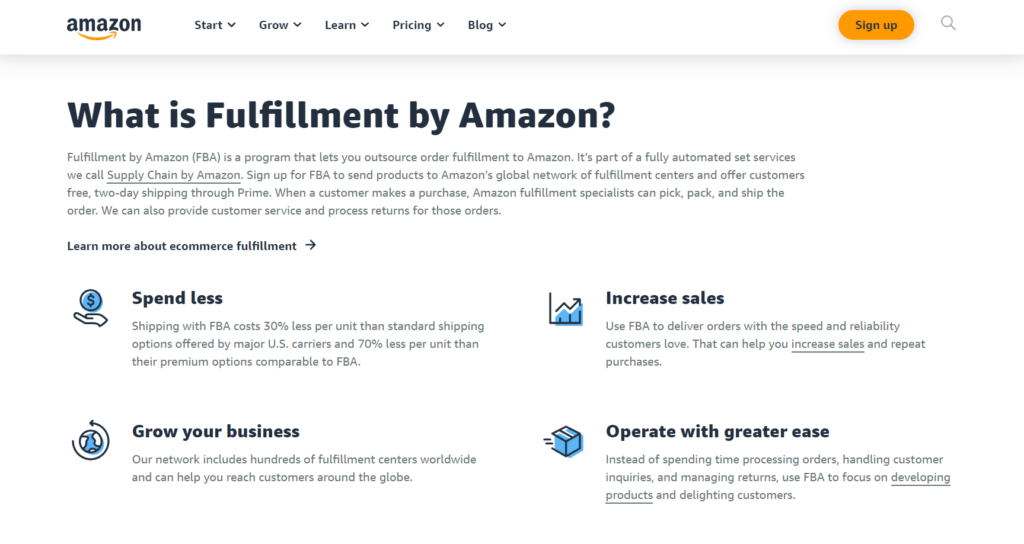
Here’s who can benefit from Amazon FBA:
- Entrepreneurs with limited resources: FBA makes it possible to start small and develop your business by eliminating the need for an upfront investment in shipping, warehousing, and packing supplies.
- Entrepreneurs making use of established brands: Well-known companies can gain from FBA’s reach and fulfilment infrastructure without giving up control over their in-house customer care or product packaging.
- Sellers of high-volume products: Amazon FBA is quite good at managing high order volumes. FBA can expedite fulfilment and free you up to concentrate on marketing and product development if you expect good sales.
- Small businesses and startups: This is because Amazon FBA allows these businesses to focus on growing their businesses, rather than worrying about fulfilment.
Who Amazon FBA Isn’t Right For?
Amazon FBA might not be the best option for:
- Businesses that sell highly customized or personalized products. Amazon FBA is designed for mass-produced products, and the company doesn’t allow for much customization.
- Businesses that sell a small number of products. If you only have a few products, the cost of using Amazon FBA may not be worth it.
- Businesses that want to control the customer experience. FBA offers a streamlined experience, but it comes at the cost of some control over these aspects of your business.
- Businesses with tight margins. FBA fees can dramatically reduce earnings, particularly for businesses with already narrow margins. Prior to making any decisions, carefully consider predicted sales volume and FBA costs to assure profitability.
- Businesses that desire total control. FBA may be too restrictive if you would rather have total control over fulfilment, packaging, and customer service interactions. Although FBA provides a more efficient experience, you give up some control over certain areas of your company.
- Sellers of perishable or fragile goods. FBA warehouses might not be the best choice for goods that are delicate or sensitive to temperature changes. Compared to a fulfilment centre that specializes in handling delicate things, there may be a greater chance of damage occurring during storage or shipment.
What Amazon FBA Offers
Amazon FBA offers a number of benefits for businesses, including:
- First, it offers access to Amazon’s fulfilment network, which is one of the largest and most efficient in the world.
- Second, Amazon FBA offers access to Amazon Prime, which can help increase sales.
- Third, Amazon FBA offers customer service and return handling.
- Fourth, Amazon FBA offers inventory tracking and management.
- Finally, Amazon FBA offers reporting and analytics, so you can track your sales and performance.
Amazon FBA Details
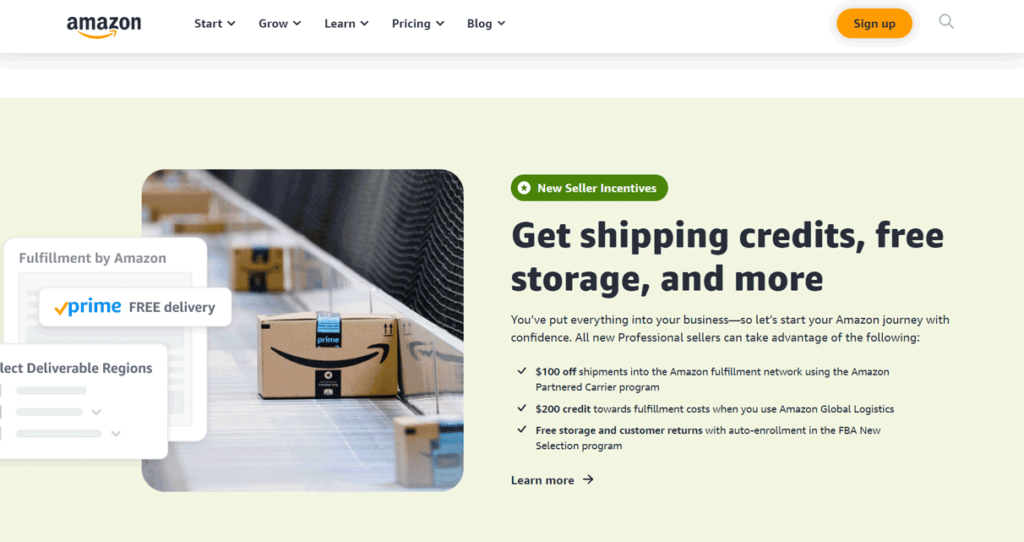
Here’s a deeper dive into the details of Amazon FBA:
Fees
- Storage fees: These cover the expenses incurred when keeping inventory at Amazon fulfilment centres. The size, weight, and length of storage all influence the fees.
- Fulfilment fees: Cover picking, packing, shipping, and handling costs per order. The size, weight, and destination zone of the goods all determine these fees.
- Referral fees: A portion of the sale price of your item that you pay Amazon as a commission for helping to make the transaction.
Inventory Management
- Inbound shipping: Delivering your goods to Amazon fulfilment centres is your responsibility.
- Inventory management tools: Amazon provides tools for monitoring stock levels and setting up alerts for when restocking is necessary.
- Removal orders: There are costs associated with removing unsold items from Amazon warehouses.
Other Considerations
- Product restrictions: Amazon imposes restrictions on specific product categories and hazardous materials. Make sure your products meet the guidelines set by the company.
- Performance metrics: Amazon monitors your order fulfilment performance metrics, including the time it takes to process your orders. Having poor metrics can have a negative impact on your account and selling privileges.
- Seller Fulfilled Prime (SFP): Qualified FBA sellers have the opportunity to provide Prime benefits, such as free two-day shipping, on their own products. This can potentially boost sales and attract more customers.
>>> PRO TIPS : How to Find Products to Sell on Amazon
Where Amazon FBA Stands Out
Here’s why FBA stands out:
Customer service assistance
The company is also known for its strong customer service, which can be a big plus for businesses that want to focus on other areas of their business. Amazon handles basic customer service inquiries for FBA orders, freeing you to focus on more complex issues.
Ease of use and reliability
Where Amazon FBA really stands out is in its ease of use and its reliability. The company has a proven track record of providing fast and accurate fulfillment. Plus, Amazon FBA is constantly adding new features and improving its service.
Fast and reliable delivery
Amazon has an extensive fulfilment network to ship goods out fast and maybe be eligible for Prime perks like free two-day shipping, which will increase customer happiness and possibly lead to an increase in sales.
Lower overhead
You can do without your own fulfillment personnel, packing materials, and warehousing. For first-time business owners or those trying to optimize processes, this can result in significant cost savings.
Huge customer base
Amazon FBA Boost the exposure of your product by carefully choosing where it appears in the Amazon marketplace and how highly it ranks.
Where Amazon FBA Falls Short
Here’s a breakdown of where FBA might not be the ideal solution:
Amazon FBA Fees. You may lose money as a result of FBA fees. Referral, fulfilment, and storage fees can add up quickly, especially for heavy or low-margin items.
Amazon FBA can be inflexible when it comes to packaging and branding. You may not be able to customize your packaging or branding as much as you’d like.
Amazon FBA can be difficult to scale, so it may not be the best option for businesses that are rapidly expanding. But overall, Amazon FBA is a great option for businesses that want to outsource their fulfilment.
Amazon supplies your products in their packaging, so you are less able to use distinctive packaging to establish your brand.
Amazon places a limit on your storage capacity. There may be an issue with this during periods of high sales.
Amazon answers the majority of simple customer service questions, which may limit your capacity to customize the customer experience and deal directly with complicated problems.
Amazon does not give you complete control over where your products are located or how visible they are in their fulfilment centres. This may affect how simple it is for buyers to find your merchandise.
How to Qualify for Amazon FBA
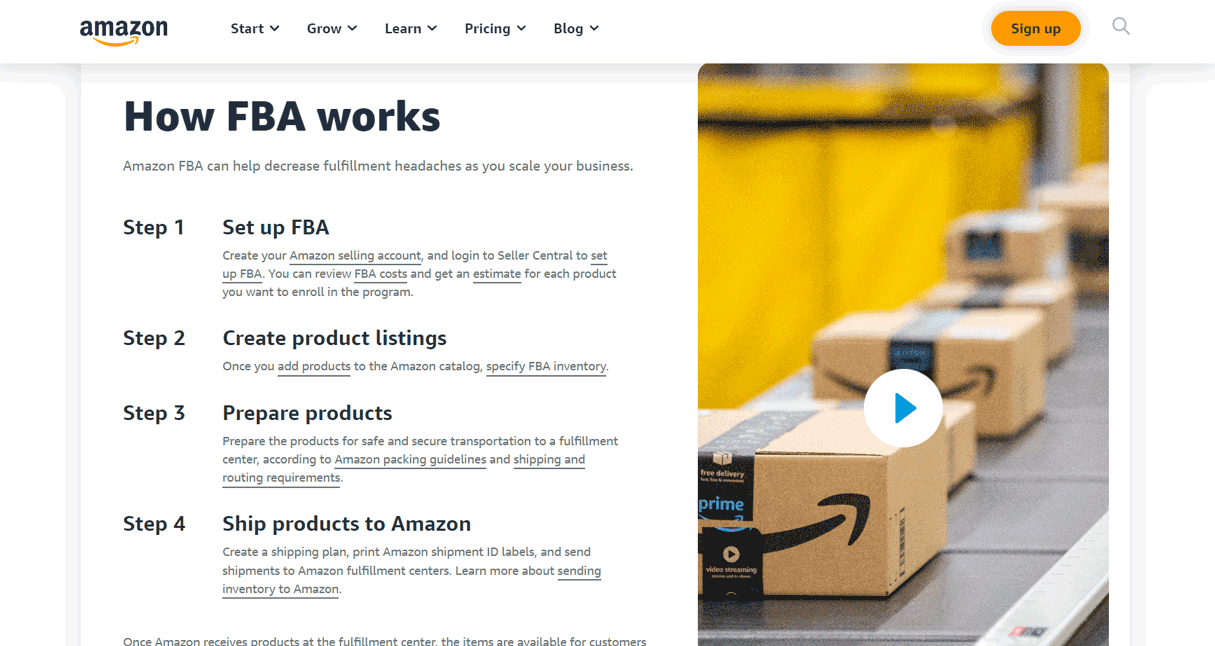
Here’s a breakdown of the steps to qualify for Amazon FBA:
Basic requirements
- Active Amazon seller account: An active Amazon seller account is required. There are two options available: the individual selling plan, designed for occasional sellers, and the professional selling plan, tailored for higher-volume sellers with added benefits.
- Business information: Make sure to provide your business and contact details.
- Tax information: Set up your tax settings on Amazon Seller Central.
- Payment method: Ensure that you have a valid payment method linked to your seller account to cover FBA fees and any additional charges.
Product eligibility
- Review guidelines: Ensure your products comply with Amazon’s product guidelines and restrictions. Some categories or hazardous materials may be prohibited.
- Product listings: Create detailed and accurate product listings on Amazon Seller Central for each item you plan to sell through FBA.
Additional Considerations
- Product preparation: Get your products ready in accordance with Amazon’s FBA labelling and packaging specifications. This could entail packaging, bundling, or particular labelling.
- Inventory management plan: Create a strategy for controlling your stock levels to prevent shortages and the buildup of storage costs. To assist you with stock tracking, Amazon provides inventory management solutions.
How to Apply for Amazon FBA
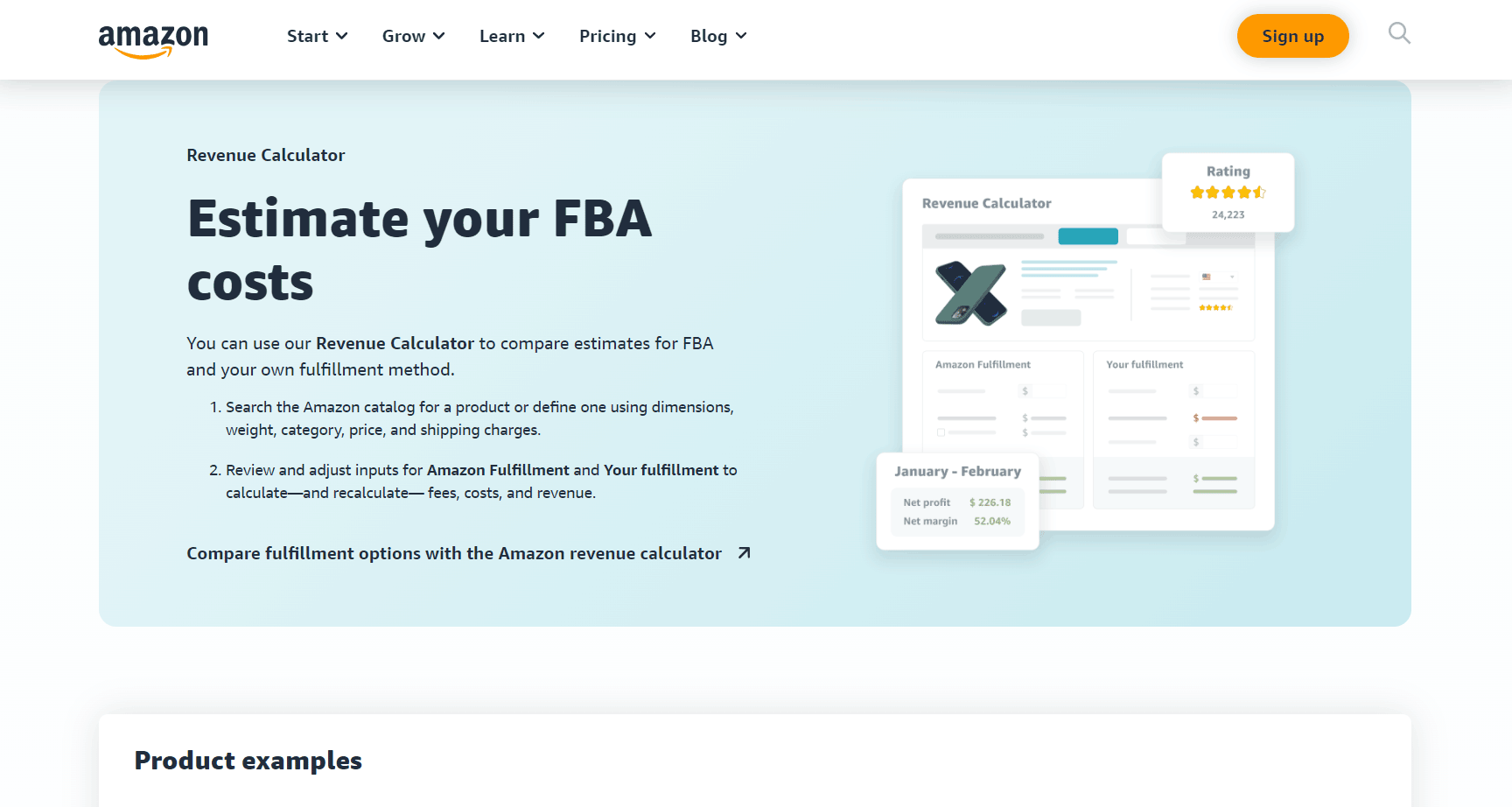
Here’s a step-by-step guide to applying for Amazon FBA:
- Set up a seller account if you don’t already have one:
- Go to https://sellercentral.amazon.com to access Amazon Seller Central.
- Establish a fresh seller account: Select between the professional selling plan, which offers additional incentives for higher-volume sellers, and the
- Individual Selling Plan, which is intended for infrequent sellers.
Include your contact details and business details. - Register your tax details on Seller Central.
- Attach a legitimate payment method to pay for additional fees and FBA costs.
- Qualify your products:
- Read Amazon’s policies: Make sure your goods adhere to their limitations. Certain classifications or dangerous substances might be forbidden. These policies are available on Seller Central.
- Create detailed product listings: For any item you intend to sell through FBA, create an accurate listing on Seller Central with clear descriptions, clear product photographs, and exact weight and dimensions.
- Enroll in FBA:
- Go to Seller Central’s “Manage Inventory” page.
- Decide which products you wish to use FBA to fulfil.
- Select “Fulfilment by Amazon” in relation to the selected products.
- Prepare your products:
- Label and package your goods in accordance with Amazon’s specifications. These instructions, which may call for specific labelling, packaging, or bundling, are accessible through Seller Central.
- Create a shipping plan:
- Indicate how you plan to transport your stock to Amazon fulfilment centres. Seller Central provides you with the means to draft a shipping strategy.
- Ship your inventory:
- Packing, labelling, and shipping your merchandise to Amazon fulfilment centres should be done in accordance with Amazon’s instructions.
Bonus Tips:
- Create an inventory management plan to prevent stockouts and reduce the accumulation of storage fees. To help you, Seller Central provides inventory management solutions.
- Review the FBM for particular products. For heavy or low-volume commodities that you manage yourself, fulfilment by merchant (FBM) could be a more affordable option.
Alternatives to Amazon FBA
Fulfilment by Merchant (FBM)
If you decide not to use Amazon FBA, you may want to consider using Fulfilment by Merchant (FBM). With FBM, you’ll be responsible for storing, packing, and shipping your own products. You’ll also be responsible for handling customer service and returns. The main advantage of FBM is that it gives you complete control over the fulfilment process. You can choose your own warehouse and shipping methods, and you’ll have full visibility into your inventory and shipping costs. The main disadvantage of FBM is that it can be more time-consuming and expensive than using Amazon FBA.
Third-Party Logistics (3PL) Providers
If you don’t want to use Amazon FBA or FBM, you may want to consider using a third-party logistics (3PL) provider. 3PL providers offer a variety of fulfilment services, including storage, packing, and shipping. They can also handle customer service and returns. The main advantage of using a 3PL provider is that you can outsource your fulfilment needs to a professional company. This can free up your time and resources so that you can focus on other aspects of your business. The main disadvantage of using a 3PL provider is that it can be more expensive than using Amazon FBA or FBM.
Customer Reviews
Amazon FBA has a rating of 4.5 out of 5 stars based on 4 reviews on G2.
A customer described it as the business partner you need. Stating that it’s very easy to use and saves time to allow small business owners to focus on more important and impactful things.
>>> GET SMARTER : ShipBob vs. Phase V Fulfillment
Pro Tips
Here are a few pro tips to keep in mind when considering Amazon FBA:
- Do your research. Make sure you understand the costs, requirements, and benefits of Amazon FBA before you make a decision.
- Consider your business’s needs. Think about your product, your customers, and your fulfilment capabilities before you decide if Amazon FBA is right for you.
- Compare your options. Consider the costs and benefits of Amazon FBA to find the best option for your business.
- Plan ahead. The sooner you start planning, the better prepared you’ll be to make a smooth transition of your inventory to Amazon.
Recap
Amazon FBA is a fulfilment service that allows you to outsource storage, packing, and shipping to Amazon. This service offers a number of benefits, including access to Amazon Prime members and international shipping.
As a seller, Amazon FBA saves you money and time in the long run. Evaluate your specific needs before deciding to use FBA. It’s important to understand the terms and conditions of Amazon FBA before signing up.


